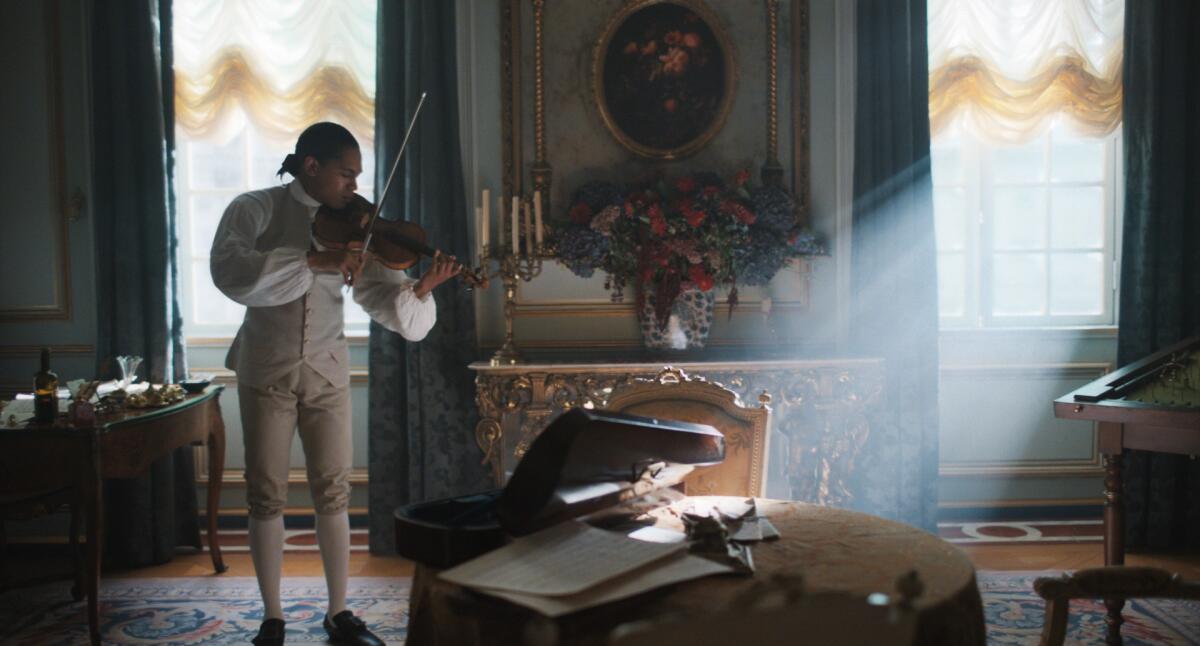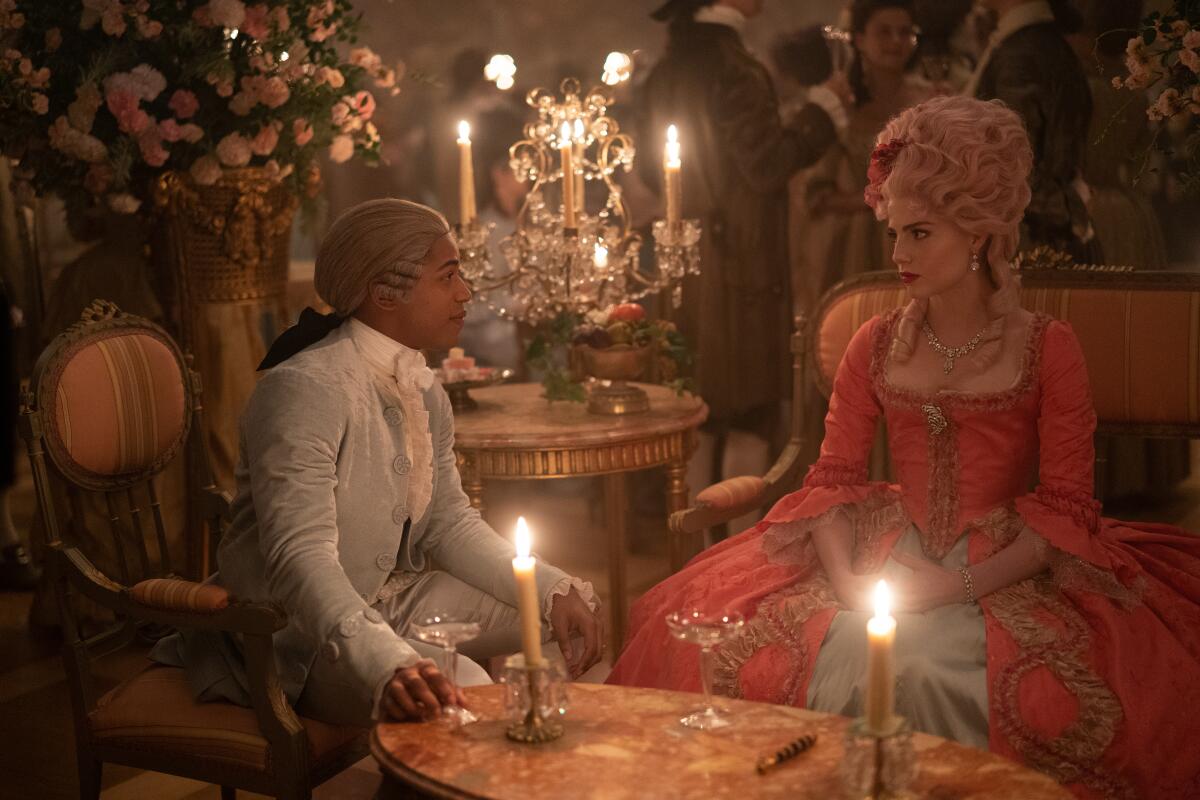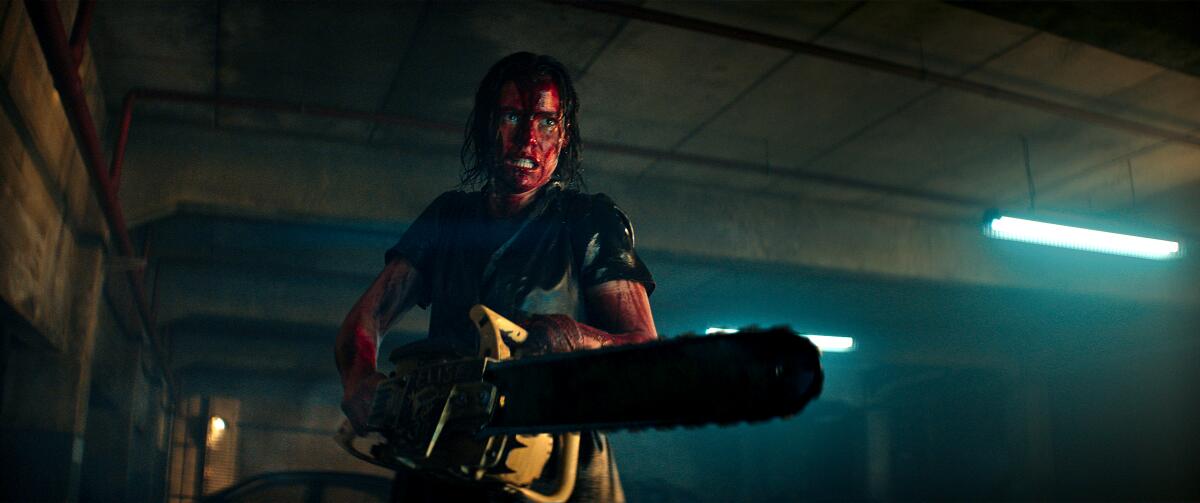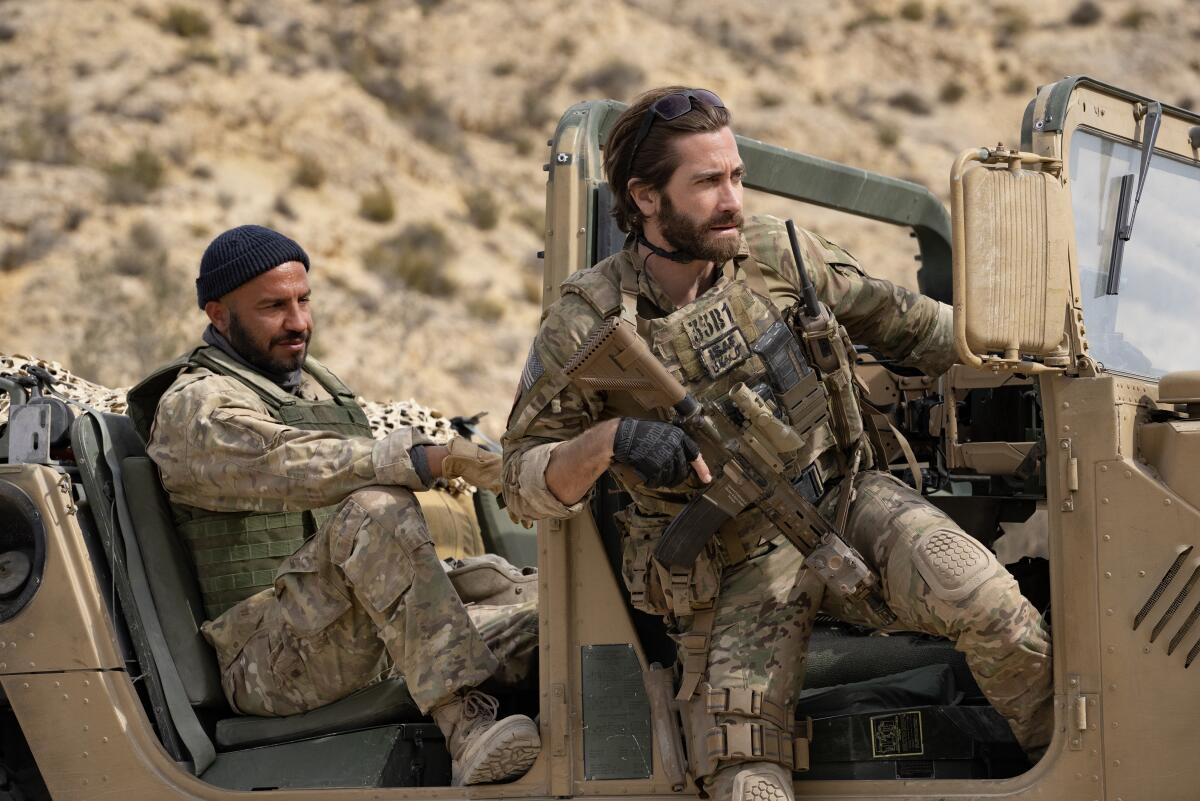A musical rebel in the French court in ‘Chevalier’

Hello! I’m Mark Olsen. Welcome to another edition of your regular field guide to a world of Only Good Movies.
Only good movies
Get the Indie Focus newsletter, Mark Olsen's weekly guide to the world of cinema.
You may occasionally receive promotional content from the Los Angeles Times.
Vidiots to open in Eagle Rock. Earlier this week I was very excited to report the news that the beloved local institution Vidiots will return June 1, opening a long-awaited new space in Eagle Rock with a movie theater, bar and a video store for their collection of more than 50,000 movies on VHS, DVD and Blu-ray. We’ll have more on the new Vidiots closer to the opening, but this is exciting news for the whole city and will probably shift the axis of what’s happening in town toward Northeast Los Angeles.
Variety’s Pat Saperstein wrote a survey of what is going on with other local theaters, most notably the Vista in Los Feliz. Closed since the onset of the pandemic and subsequently bought by Quentin Tarantino, the venue is reported to be reopening sometime this year and will feature first-run movies in 35mm or 70mm film. Both openings should be a real shot in the arm to local moviegoing.
Owen Roizman tribute. The American Cinematheque has launched a series celebrating the work of Owen Roizman, the five-time Academy Award-nominated cinematographer who died in January at age 86. Basically every movie in the series is a total banger and demonstrates the breadth of Roizman’s abilities, including Ulu Grosbard’s “Straight Time” and “True Confessions,” Lawrence Kasdan’s “I Love You to Death” and “French Kiss,” Sidney Lumet’s “Network,” William Friedkin’s “The French Connection” and Barry Sonnenfeld’s “The Addams Family.” Elaine May’s “The Heartbreak Kid,” currently difficult to see due to legal issues, will screen in a rare 35mm print courtesy of the British Film Institute. See it while you have the chance.
‘Joyland’ in L.A. The first film from Pakistan to compete in the Cannes Film Festival, “Joyland” won the Un Certain Regard sidebar last year and is playing now in Los Angeles. The film also won the Spirit Award for international feature and was shortlisted for the same prize at the Academy Awards. The debut feature from director and co-writer Saim Sadiq, the film is a sensitive, affecting story of family and queer love. In his review for The Times, Justin Chang called it “a visually arresting, politically forceful melodrama.” Having faced censorship issues at home in Pakistan, the movie has garnered support from the likes of Malala Yousafzai, Riz Ahmed, Jemima Khan and Ramin Bahrani, all of whom are credited as executive producers.
Enjoying this newsletter? Consider subscribing to the Los Angeles Times
Your support helps us deliver the news that matters most. Become a subscriber.
‘Chevalier’
Directed by Stephen Williams from a screenplay by Stefani Robinson, “Chevalier” is the fact-based story of Joseph Bologne, Chevalier de Saint-Georges, a Black French-Caribbean composer and musician whose very presence challenged the ways of the 18th century French court. The film stars the dynamic Kelvin Harrison Jr. as Bologne, with a supporting cast including Minnie Driver, Samara Weaving and Lucy Boynton. The film is in theaters now.
For Tribune News Service, Katie Walsh wrote, “It’s unclear exactly what kind of movie ‘Chevalier’ wants to be. It flirts with being a contemporary pop retelling of Joseph Bologne’s life story, in the style of Sofia Coppola’s ‘Marie Antoinette’ — Weaving’s performance is jarringly modern — but it also seems to want to be a true period piece that asserts the presence of Black people, and Black artists, in history, too often erased and whitewashed in films of this kind. But the noncommittal tone saps authenticity from the film, and Harrison is left floundering to put together a compelling performance from an uncomplicated character. Telling the story of Joseph Bologne, Chevalier de Saint-Georges, is a crucial and necessary corrective to the historical record and our understanding of this time period. But ‘Chevalier’ the film fails to express the radical spirit that it seemed to promise.”
For the New York Times, Lisa Kennedy wrote, “Outlier and insider, he’s a figure ripe for reclamation. That this movie — directed by the Canadian filmmaker Stephen Williams and written by Stefani Robinson — leans too mightily on romance to the detriment of exploring more fully his genius feels like a missed opportunity. Joseph’s father’s parting words as he leaves his young son at an elite school will become Joseph’s raison d’être as he excels in music, fencing and pretty much anything else he takes on: ‘Joseph you must be excellent, always excellent. No one can tear down an excellent Frenchman.’ As the movie unfolds, that final assertion will require a qualification — namely, unless that Frenchman is Black — but the drive it instills in Joseph also resonates with the current celebration of Black excellence in the United States.”
For the AP, Lindsey Bahr wrote, “It’s all serving to get Bologne, who had been quite content playing the necessary games to thrive within the system, to reach a moment of radicalization and revolt (along with much of France) as he grapples with injustices and prejudices. The arrival of his mother helps shatter his illusions too. In the end, ‘Chevalier’ may be more fiction than history, but it’s worthwhile with effective acting, tension (helped by Kris Bowers’ score) and a decadently beautiful production. And it is especially important in a moment of fanciful ‘Bridgertons’ to focus the lens on important people of color who did actually exist and who have been forgotten and erased.”
For Deadline, Valerie Complex wrote, “Robinson’s script is sometimes a little too on the nose, but she doesn’t make him a sympathetic character, which is refreshing. … ‘Chevalier’ is a lesson in what happens when we get in our own way. Joseph did whatever he wanted to do and paid the price. He gets dropped by every white person he coveted and this crushes his ego. The virtuoso was told to strive for perfection (whiteness), and the door is slammed in his face when he does. That is white supremacy in a nutshell. However, out of the struggle, he gains autonomy and dignity and uses his music not to entertain white people but as a form of rebellion.”

‘Evil Dead Rise’
Written and directed by Lee Cronin, “Evil Dead Rise” is the newest installment in the venerable horror franchise that launched the career of filmmaker Sam Raimi with its mix of humor and horror. The new film tells the story of two sisters, Beth (Lily Sullivan) and Ellie (Alyssa Sutherland), who find themselves doing battle with a demonic spirit. Much chaos ensues. The movie is in theaters now.
For The Times, Jen Yamato wrote, “Mileage may vary for what audiences crave, and can take, when it comes to the gruesomely R-rated parade of stomach-churning gore, goo, barf and blood that ensues in and around this increasingly claustrophobic apartment. … Adding to Hollywood’s recent spate of boldly batty genre pictures, Cronin wields violence like a finely tuned instrument with a wickedly funny sense for weaponizing sharp objects, kitchen appliances, fraught family dynamics —and, memorably, a cheese grater — for maximum impact.”
For the Playlist, Jason Bailey wrote, “A viewer’s experience depends disproportionately on their personal expectation of what an ‘Evil Dead’ movie should be. … The fundamental problem with these new ‘Evil Dead’ reboots or reimaginings, or whatever the hell they are, is the same one the Wes Craven-less nu-‘Scream’s’ suffer from. These series are so imbued with the original filmmaker’s sui generis personality that making one without that is ultimately a futile enterprise. Whatever blessing Raimi may give Cronin’s film, and whatever (presumably minimal) participation he may have as an executive producer, ‘Evil Dead Rise’ is not a Sam Raimi movie. Boy, oh boy, is this not a Sam Raimi movie. And that makes Cronin’s take not much of an ‘Evil Dead’ movie either.”
For the Hollywood Reporter, Lovia Gyarkye wrote, “In some ways, ‘Evil Dead Rise’ is as much an homage as it is a corrective to Raimi’s original low-budget treat, which has been called out for its shallow and misogynistic treatment of women. They are not only widely considered underwritten, but also endure the most sadistic scenes. The women who populate Cronin’s film don’t suffer any less at the hands of the demonic spirits, but at least they have the chance to lead the charge in their own salvation. … Cronin’s film is a wonderfully sick series entry, deftly calibrated to satisfy fans and traumatize the uninitiated.”

‘Guy Ritchie’s The Covenant’
Directed and co-written by, you guessed it, Guy Ritchie, “Guy Ritchie’s The Covenant” is an unexpected change-up from the filmmaker whose long-delayed “Operation Fortune” reached theaters less than two months ago. A straightforward and sincere action-drama of wartime camaraderie, the new film stars Jake Gylllenhaal as a U.S. Army sergeant who goes back to Afghanistan to extract the interpreter (Dar Salim) who saved his life and now lives in danger of retribution from the Taliban. The movie is in theaters now.
For Tribune News Service, Katie Walsh described Ritchie’s movie as “ the best film he’s made in years.” Walsh added, “Ritchie bites off meatier material with ‘The Covenant,’ and it’s a pleasure to see him work with two legitimately great actors as well. … At times the acting, filmmaking and tone are a bit too thrilling, considering the seriousness of the topic. Tackling such an overtly political subject is a new direction for Ritchie, though examined through the perspective of his oeuvre, it’s not so radical, considering it’s a story about a lone man harnessing a criminal mindset to go outside the system to pay off his debt. His approach is to inspect this question on a micro, man-to-man level, but extrapolated to the macro, it’s damning to consider the many life-or-death deals left unfulfilled in Afghanistan.”
For the New York Times, Amy Nicholson wrote of the film, “Sincerity is an unusual tone for its director, Guy Ritchie, who specializes in laddish shoot-’em-ups. Here, Ritchie is not just earnest — he’s morally outraged about the broken promises made to thousands of Afghans who believed they’d earned Special Immigrant Visas only to be abandoned to fend for themselves. For all its clichés, this furious and discomfiting film tugs on your conscience for days, making a powerful case to turn the American public’s attention back to a conflict it would rather forget.”
For IndieWire, Siddhant Adlakha wrote, “The premise is hardly ‘Ritchie-esque’ upon first glance, with a straightforward intensity that conceals no surprise tonal oscillations. However, it remains firmly within Ritchie’s stylistic wheelhouse — his command of the swiftly moving camera, and its focus on violent masculine subjects, are intact — while proving to be intense and effective as a straightforward war drama. It might even lead one to ask why [he] hasn’t been making ‘serious’ cinema this whole time. … Some twenty years into Hollywood’s modern Middle Eastern war films, it becomes increasingly difficult to excuse continued flaws, like the reduction of entire peoples purely to the context of their invaders, and their own allegiances therein. However, Ritchie’s entry into the genre breathes stylistic life and bombast into what hasn’t felt like a cinematic event in over a decade. He earns having his name appear alongside the title.”

Only good movies
Get the Indie Focus newsletter, Mark Olsen's weekly guide to the world of cinema.
You may occasionally receive promotional content from the Los Angeles Times.




